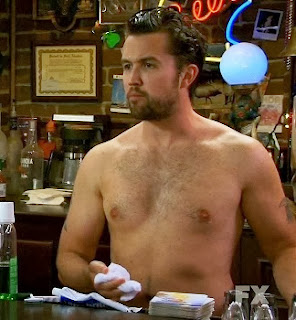It's Always Sunny in Philadelphia has been airing on FX since 2005, but since it has less than half of the number of episodes of an ordinary sitcom, it's only up to about 100 episodes to date.
The premise sounds like many sitcoms: Five friends run a bar together, and engage in various wacky schemes to make money or improve their social standing in the community:
1. The Ivy-League-educated but underachieving Davis (Glenn Howerton, far left).
2. His twin sister Dee, an aspiring actress.
3. Davis's roommate, muscular martial-arts enthusiast Mac (Rob McElhenney)
4. The dimwitted Charlie (Charlie Day, right and above)
5. Davis and Dee's crooked millionaire dad, Frank (Danny DeVito, not shown).
But it's not like any other sitcom on television.
First, there's a lot of improv.
Second, there are complex interconnecting storylines, a la Seinfeld.
Fourth, it's comedy genius.
There is no homophobia (although in one episode Mac feigns homophobia to win back his transsexual ex-girlfriend).
Gay characters appear frequently, and gay subtexts abound.
Actor Glenn Howerton states that he plays Davis as "ambiguously gay," longing for the attention of both men and women. Davis and Mac are roommates and homoromantic partners who go out to a nice dinner every month, "just the two of us."
Frank and Charlie are obviously lovers. They live together, sleep in the same bed, and play naked games with unspecified rules. They get married, and later file for divorce, but decide to stay together when their divorce lawyer points out the "love between them."
When Frank begins dating Charlie's mother, Charlie devises a wild scheme to break them up, and then yells "Don't try to steal my man again!"
 They go out for an anniversary dinner, and Frank begins a speech: "Meeting you has changed my life..." before he's interrupted.
They go out for an anniversary dinner, and Frank begins a speech: "Meeting you has changed my life..." before he's interrupted.All of the guys have respectable physiques, and there are substantial shirtless and semi-nude scenes.
Did I mention that it's wildly funny?
The actors are all gay allies. Rob McElhenney (left), who plays Mac, was "partially raised by two moms."
Enough talk -- go to Netflix or Amazon and start watching, already.
See also: Trailer Park Boys


















